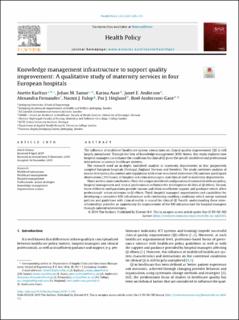| dc.contributor.author | Karltun, Anette | |
| dc.contributor.author | Sanne, Johan M. | |
| dc.contributor.author | Aase, Karina | |
| dc.contributor.author | Anderson, Janet E. | |
| dc.contributor.author | Fernandes, Alexandra | |
| dc.contributor.author | Fulop, Naomi J. | |
| dc.contributor.author | Höglund, Par J. | |
| dc.contributor.author | Andersson-Gäre, Boel | |
| dc.date.accessioned | 2023-01-25T12:43:05Z | |
| dc.date.available | 2023-01-25T12:43:05Z | |
| dc.date.created | 2020-01-30T11:22:22Z | |
| dc.date.issued | 2019 | |
| dc.identifier.citation | Karltun, A., Sanne, J. M., Aase, K., Anderson, J. E., Fernandes, A., Fulop, N. J., ... & Andersson-Gare, B. (2020). Knowledge management infrastructure to support quality improvement: a qualitative study of maternity services in four European hospitals. Health Policy, 124(2), 205-215. | en_US |
| dc.identifier.issn | 0168-8510 | |
| dc.identifier.uri | https://hdl.handle.net/11250/3046313 | |
| dc.description.abstract | The influence of multilevel healthcare system interactions on clinical quality improvement (QI) is still largely unexplored. Through the lens of knowledge management (KM) theory, this study explores how hospital managers can enhance the conditions for clinical QI given the specific multilevel and professional interactions in various healthcare systems.
The research used an in-depth multilevel analysis in maternity departments in four purposively sampled European hospitals (Portugal, England, Norway and Sweden). The study combines analysis of macro-level policy documents and regulations with semi-structured interviews (96) and non-participant observations (193 hours) of hospital and clinical managers and clinical staff in maternity departments.
There are four main conclusions: First, the unique multilevel configuration of national healthcare policy, hospital management and clinical professionals influence the development of clinical QI efforts. Second, these different configurations provide various and often insufficient support and guidance which affect professionals’ action strategies in QI efforts. Third, hospital managers’ opportunities and capabilities for developing a consistent KM infrastructure with reinforcing enabling conditions which merge national policies and guidelines with clinical reality is crucial for clinical QI. Fourth, understanding these interrelationships provides an opportunity for improvement of the KM infrastructure for hospital managers through tailored interventions. | en_US |
| dc.language.iso | eng | en_US |
| dc.publisher | Elsevier | en_US |
| dc.rights | Navngivelse 4.0 Internasjonal | * |
| dc.rights.uri | http://creativecommons.org/licenses/by/4.0/deed.no | * |
| dc.title | Knowledge management infrastructure to support quality improvement: A qualitative study of maternity services in four European hospitals | en_US |
| dc.type | Peer reviewed | en_US |
| dc.type | Journal article | en_US |
| dc.description.version | publishedVersion | en_US |
| dc.rights.holder | The authors | en_US |
| dc.subject.nsi | VDP::Medisinske Fag: 700 | en_US |
| dc.source.pagenumber | 205-215 | en_US |
| dc.source.volume | 124 | en_US |
| dc.source.journal | Health Policy | en_US |
| dc.source.issue | 2 | en_US |
| dc.identifier.doi | 10.1016/j.healthpol.2019.11.005 | |
| dc.identifier.cristin | 1786117 | |
| dc.relation.project | SHARE - Centre for Resilience in Healthcare: 5091 | en_US |
| dc.relation.project | EC/FP7/241724 | en_US |
| cristin.ispublished | true | |
| cristin.fulltext | original | |
| cristin.qualitycode | 1 | |

